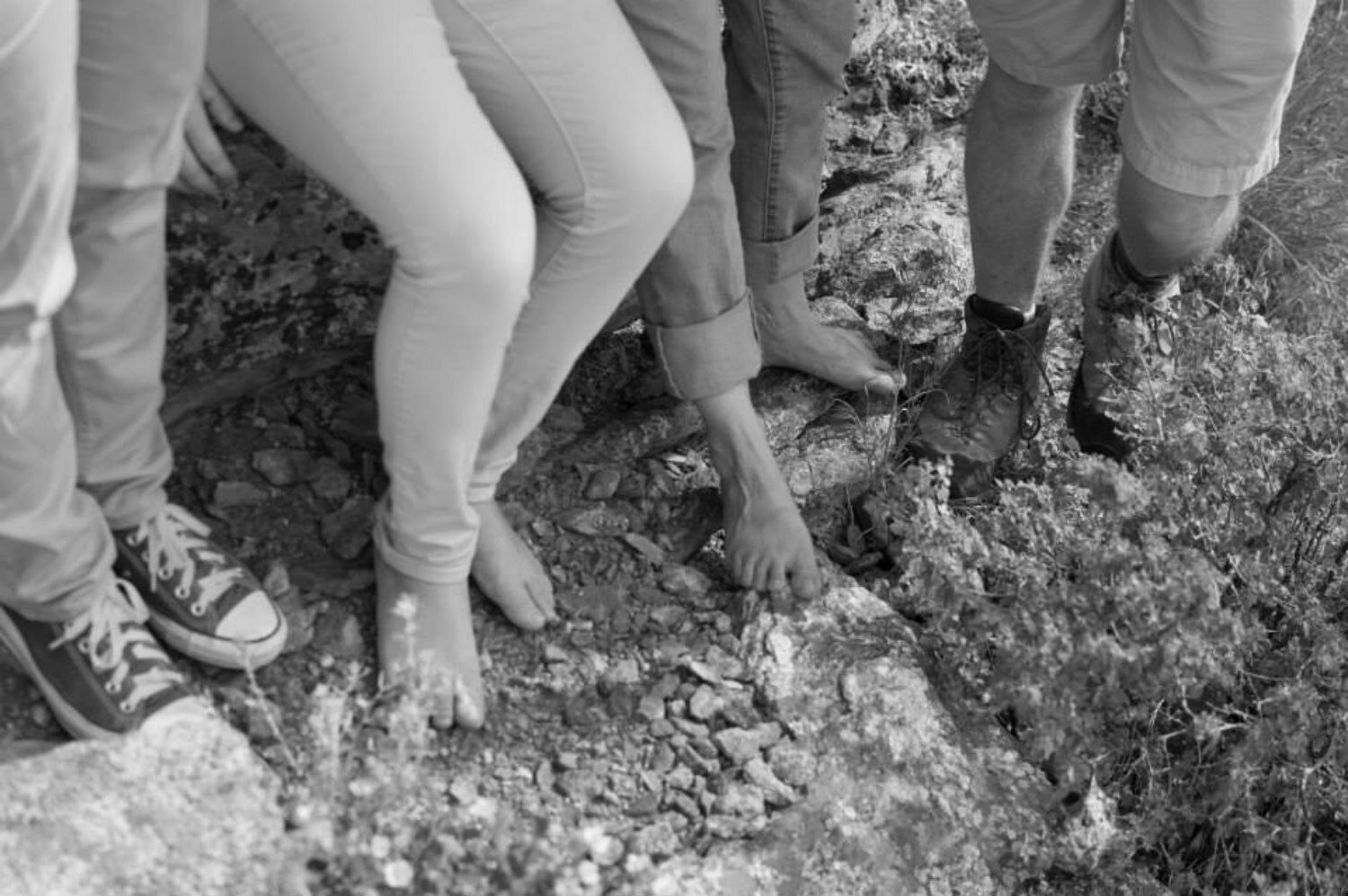
What We Wish We Would’ve Known
Whenever Dan & I talk about our earliest years together, we commiserate over how much worse we accidentally made everything through our well-meaning but disastrous best intentions.
Our hindsights about blending our family have become the ultimate "If only we’d known then what we know now." In the moment, you don't realize just how big an impact your actions (or inactions) as parents/stepparents will have months or years later. When we look back, we want to shake our past selves and yell "UGH why did/didn't we do X instead of Y?!"
So here's our top list of things we wish we'd done differently, in the hopes that we can save some other stepfamilies even a fraction of the self-bludgeoning we put ourselves through.

1. The default setting for blending a family is "hard"
Life is already complicated and messy just on your own; and add another adult and their kids (and their ex 😱) to that mix and the complicated/messy factor spikes up exponentially. This seems so logical and obvious that it shouldn’t have come as a surprise… yet somehow, it did.
Dan and I were both single parents when we met. The idea of dating someone with a kid didn’t faze either of us. Both of us were kid people so neither of us felt like adding another kid to the mix was a big deal. We’d also both been apart from our respective exes for long enough that our co-parenting relationships were pretty well sorted out; we didn’t consider either of them as a factor in our ability to blend.
Except when he & I got together, suddenly all our well-established patterns of parenting and co-parenting stopped working. Existing dysfunctions that had previously seemed minimal or manageable became untenable. Recognizing that was its own challenge, but then the process of figuring out new ways forward — as a couple and as a stepfamily — turned out to be absurdly, disproportionately difficult.
The transition from single to stepfamily puts a lot of pressure on a new stepcouple. And because so few people talk openly about how challenging blending a family can be, no one’s really out there offering solutions either. Which led us to think our issues were rare and/or unsolvable… or maybe meant something was inherently wrong with us. Either as individuals or as a couple.
Dan & I thought surely we must be making tons of mistakes when our everyday stepfam life kept getting harder instead of easier. Surely the problem was something we were doing or not doing — something horribly wrong.
Nope! Life in a blended family is just plain hard, especially for those folks dealing with a high-conflict ex. There's no way around it. The only way out is through. Knowing that ahead of time would've saved us tons of guilt and frustration along the way. We wasted a lot of time and energy blaming ourselves… and sometimes, each other.
It’s normal for stepfam life to feel ill-fitting and awkward. It’s okay if you don’t really feel blended, especially at first. That doesn’t mean you’re failing or doing anything super wrong or even that you’re not working enough at this. It’s just that the default setting is hard.
2. You & your partner are in this together
Stepparents have a tendency to think the process of “blending” lands pretty much on our shoulders… and unfortunately, our partners often hold that belief too. Like our job as stepparents is to fit ourselves into our partner’s life and existing family, and any necessary compromises need to come from our side.
This belief can lead stepparents into taking on wayyyy too much — whether that means trying extra hard to win our stepkids over, or trying extra hard to not have needs of our own. This isn’t sustainable, and ultimately leads to stepparenting resentment and burnout.
Neither Dan nor I realized that successfully blending a family requires the active commitment of both partners, along with compromise from everyone in the stepfamily. Yep, even the kids!
A stepparent isn’t really becoming part of a pre-existing family. Instead, you and your partner are creating a new family. Together. And making that mindset shift from “stepparent vs. existing family” to “stepcouple vs. challenges that affect both of us” is critical in the eventual success of your blended family.

3. We should've put our RELATIONSHIP first
Single parents tend to believe that we should put our kids’ needs first as much as possible, even to our own detriment. We think that to do otherwise makes us irresponsible parents.
So if (for example) our kids don’t really vibe with the person we’re dating, we’ll prioritize our kids’ comfort level over the nurturing that a new relationship needs to grow. We do this because we believe that’s what’s best for the kids, and the needs of our relationship matter less.
This incorrect belief led Dan & I to make some really knuckle-headed decisions in the earliest days of blending our stepfamily. Like when Dan’s kid made it super duper clear she didn’t want me or my daughter around, Dan & I agreed that we should take a step back from spending time together as a foursome.
Except by doing so, we inadvertently painted ourselves into a corner. Because how was SD supposed to get more comfortable with us when we never spent time together? And in what world should a 7-year-old be in charge of their parent’s dating life anyway?
We thought we were giving his kid time to come around; instead, we taught her that my presence (and my own kid’s presence) in her life was optional. What a terrible foundation to try and build a family on.
Instead of trying to cater to a little kid’s understandably mixed-up emotions, Dan & I should've prioritized our relationship first. We should've made it clear from the beginning that I wasn't going anywhere and that, yes, all our lives would change as a result. We could have then reassured SD that change was not a bad thing, that maybe if she got to know me she'd see I wasn't the big meanie she made me out to be. That, like it or not, we were becoming a family, and that meant we’d all need to learn how to get along. Uncomfortable or not.
Putting your relationship first in a blended family is so critical that we have a whole separate blog post on it: ➡️ WHY YOUR RELATIONSHIP (NOT THE KIDS) SHOULD COME FIRST IN A STEPFAMILY 👀
4. More one-on-one time with my stepkid would've helped
My future stepdaughter followed a very normal emotional arc when we met. At first, she liked me. I did have books on fairies, after all. I collected fun and curious things like heart-shaped rocks. And I liked to sing in the car. Bonus: I had a daughter the same age as her.
The brief honeymoon phase deflated once SD realized that me being around meant her losing out on one-on-one time with her dad. Then she got sulky. (Again, this is a very normal emotional arc for stepkids.)
As a realist and a kid person both, I never expected SD to fall in love with me at first sight. But I did not expect the level of rejection she directed my way, like she hated me for something I didn’t even know I'd done. Just for showing up in her life, apparently?
So I let SD do her thing and I did mine. She was adamant about not wanting to spend a second more in my presence than she absolutely had to; I respected her wishes and backed off. And stayed backed off for years.
At the time, I thought I was doing the right thing by not pushing. Dan & I kept thinking, we’ll take things slow. Wait till SD gives us a sign that she's okay I'm around. In hindsight, I believe keeping my distance from my stepkid for so long was one of the worst mistakes I made as a stepmom.
I did my best to show my stepkid I cared about her in the usual million little ways that stepparents try: bought her presents, cooked her foods I knew she liked, volunteered to drive her places, stepped up immediately any time I thought I could contribute in a positive way.
The one thing I didn't try, though, was doing more things with SD just the two of us. It just felt so uncomfortable. I mean, this was a kid who left the room when I walked in. She didn't just dislike me; she didn’t even want to be around me. Why would I put both of us through what would surely be a miserable time for both of us, whatever activity we tried to do together?
Turns out stepparenting, like everything else, takes practice. Early discomfort between stepparent and stepkid is normal, and eventually would've faded out. Time one-on-one with my stepdaughter — awkward as it may have felt for both of us — would've put a stop to the stories we both told ourselves in our heads about each other. Not spending time together to counteract those stories only helped them grow stronger.

5. Getting outside help earlier would've been better
The longer I stepparent, the more I realize just how in over my head I was in my earliest days of dating Dan and meeting my stepdaughter. Dan says the same about his own level of overwhelm. So why, when we were both so damn lost in varying degrees of drowning and uncertainty, WHYYYY THE HELL DID WE NOT GO TO COUNSELING. 🤦🏻♀️
Instead, we kept fighting over and over again in circles about the same issues, then getting frustrated that nothing improved. We didn’t realize that the reason why nothing improved was because we simply didn’t have the knowledge or the skill set necessary to navigate the challenges we were facing — as individuals, as a couple, and as a new family. A counselor could’ve given us the tools we had no idea we desperately needed.
In addition to counseling, we should've educated ourselves more about blended family dynamics. We would've discovered that, while a lot of what we were going through was normal, there were also plenty of red flags indicating more serious issues that would’ve benefitted from professional advice and support — like high conflict and parental alienation.
6. THE EX SHOULD NOT BE A FACTOR IN YOUR FAMILY
It never occurred to me that Dan’s co-parenting relationship with his ex would have any impact on our relationship whatsoever. But we ended up fighting more about his ex than any other challenge we faced while blending our family.
Dan’s ex was often difficult, and he’d fallen into the habit of going along with just about anything if he thought it’d keep her happy. I got so frustrated by him agreeing to last-minute visitation schedule changes that cost us time together as a family. I didn’t understand why he couldn’t just stick to their dang custody order. Even worse, the favors Dan did for his ex weren’t reciprocated, so he wasn’t trading time with his kid — he was just giving it away.
I felt like Dan’s ex was manipulating him and taking advantage of his good nature. Dan felt he needed to appease his ex at all costs or she’d retaliate by getting really nasty — withholding visitation or worse. We were both right.
I reminded him he had a custody order that protected him. He just looked nervous and continued jumping whenever she said frog. I didn’t understand then that his reaction was actually a trauma response — we talk about that in more detail in EP019 over on our private podcast.
Regardless of the reasons though, Dan’s toxic co-parenting relationship was so all-encompassing that the dysfunction spilled over into our own relationship and our own family. Building forward momentum together as a couple and as a family was impossible while Dan kept jumping through his ex’s hoops. And by not maintaining boundaries with his ex or protecting our time together as a family, he was also indirectly teaching his kid that time with us mattered less than time with her mom.
I can’t tell you how much Dan regrets this.
At the end of the day, we only have so much bandwidth. If we’re putting our resources toward managing the ex, then we’re not giving them to the current family we’re trying to build.
7. More laughter would've been better
Laughter was our first casualty. Joking around, teasing each other — all of that went out the window very early on.
Dan & I say often how we'd take everything less seriously if we could go back in time. Pick our battles more selectively and not bend over backwards trying to appease his kid (or his ex).
We would've let SD be unhappy if she chose to be unhappy, and wouldn't have let her bad moods ruin our limited family time together. Dan wouldn't have spent hours in SD's room with her trying to solve fake problems, dropping everything to hover over her. Instead, he would’ve encouraged her to spend time on her own if that’s what she felt she needed while the rest of us would’ve continued enjoying whatever we were doing.
Not because he didn’t care about his kid, but because laughter is the best antidote to drama. Because good humor is contagious, and there isn't a child alive who doesn't eventually want to come out and join the fun in the next room instead of wallowing in their own self-imposed misery alone.
We should have laughed more. We should have had more faith that this, too, would pass — that SD's behavior was all a phase. Giving too much weight to SD's whims only gave her way more power than was healthy.

the key to successfully blending
Blending a family takes 5 to 7 years on average, and 10+ years in high conflict. Here’s what’s happening during that decade or so:
Every member of your blended family is moving along at their own individual speed of acceptance, which is probably not the same speed as other members of the family.
You and your partner are learning about stepfamily dynamics — what works or doesn’t work within your own blended family, and adjusting your expectations accordingly.
You and your partner are slowly shifting your priorities and actions to align with your new stepfamily rather than continuing to do things the way you previously did.
At least, that’s what should be happening in order for your stepfamily to successfully blend.
And this is where so many of us get tripped up — we compare blended families to traditional families, and get frustrated that nothing’s working quite like we think it should. But the bonds that hold a stepfamily together aren’t the same bonds that hold a traditional family together, and they don’t develop in the same way or at the same speed.
It’s easy to beat ourselves up for not blending our families perfectly, but hey — we’re all imperfect humans. Perfection was never a realistic end goal.
So what’s the key to successfully blending? Patience. Lots and lots and lots of patience. And also: plenty of flexibility! I mean holy cow, come prepared to turn yourself into a pretzel along the way. Compromise within your family is must — and having strong boundaries outside the family is also a must.
Dan & I spent our main blending years alternating between beating ourselves up and beating our heads against a brick wall. I wish we’d been gentler with ourselves. If we’d educated ourselves about stepfam life, we’d have learned we weren’t failing; blending just occurs at a glacial pace. Our old ways of doing things needed to fall away to make room for the new blended family we were trying to build. A process that, again, literally takes years.
Take it easy on yourself — and your partner, and the kids — along the way. 🧡
